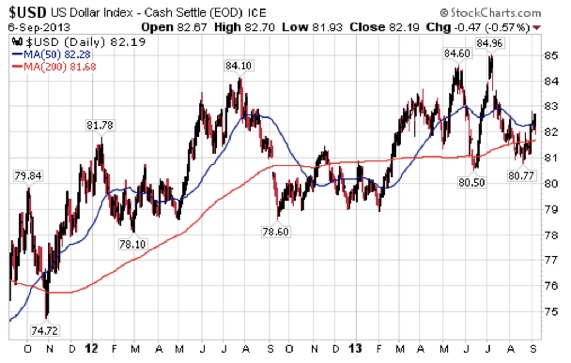On the heels of continued volatility in key global markets, the Godfather of newsletter writers, Richard Russell, discussed JP Morgan involvement in the gold market and the future of the US dollar. Russell also warned about the massive worldwide debt, covered stocks, and also included two charts of gold and the US dollar.
Personal Finance
 In the mid-1970s, an investor with tremendous business experience, Warren Buffett, became the business “coach” and confidant of the Washington Post‘s Katharine Graham. Graham became chairman and CEO of the newspaper company unexpectedly when her husband committed suicide. She leaned heavily on Buffett’s business judgment – especially when it came to the question of how to manage the business fund. Buffett addressed that critical question in a private letter to Graham.
In the mid-1970s, an investor with tremendous business experience, Warren Buffett, became the business “coach” and confidant of the Washington Post‘s Katharine Graham. Graham became chairman and CEO of the newspaper company unexpectedly when her husband committed suicide. She leaned heavily on Buffett’s business judgment – especially when it came to the question of how to manage the business fund. Buffett addressed that critical question in a private letter to Graham.

Michael’s Sept 10th Comment on the student expectations for employment post-university and the reality of their training.

 Last week’s blog about old Doc, the sardine trader, generated a lot of feedback…the essential question was, ”But how does this story help me to understand today’s gold market?”
Last week’s blog about old Doc, the sardine trader, generated a lot of feedback…the essential question was, ”But how does this story help me to understand today’s gold market?”
Here’s how:
The purpose of that lovely old story, and why it gets re-told and re-told down through the years, is to get people to understand that the Paper market is NOT the Real market…no matter if you are talking about gold or sardines.
…..read more HERE


This is our first live webinar and due to the contraints of the technology only the first 500 listeners will be able to register.
Michael Campbell
HOW TO REGISTER
1) CLICK HERE to register or paste this address into your browser – https://www.disnat.com/en/knowledge/event_register.aspx?EventId=d2dac22c-40ff-47f3-b4d3-1da8962fc850
2) Once you click Submit you will be sent an email with the subject – Web seminar scheduled: Market Overview with Disnat GPS Portfolio Strategist. This email will include the link you will use to join the webinar on Saturday. The webinar will begin immediately after the show at 10:15am pacific time on Sat Sept 14th. You will be able to join the webinar as soon as the show starts at 8:30am Pacific.
HOW TO JOIN ON SATURDAY
1) Open your confirmation email and CLICK on the link
Enter your name and email. The event password is – DISNAT.
Click Join Now.
Confirm your email address and click Submit
2) JAVA requirement – If you do not have Java on your computer the system will ask you to add this small, free piece of software.
CLICK Use Java link
CLICK Run
At this point you should be able to see the workshop slides on your screen
You can adjust the volume on the page to hear through your computer speakers.
*N.B. If you cannot hear through your computer you can listen over the phone!
Dial 1-866-699-3239
Enter 667 097 102
If you are having any difficulties please feel free to call the Disnat Customer Service at 1-866-873-7103 or call the MoneyTalks office 1-877-926-6849
If you would like more detailed instructions CLICK HERE for a complete visual demonstration.

The Fed now owns $2.2 trillion in federal debt. This year, in 2013, the Fed has purchased more debt than the Treasury has issued. I could go on and on about the horrors of the debt situation. But remember, the market is not stupid. It contains all the information known to everybody. This is the reason that I follow the markets so closely. If we are heading into a brick wall, the market will know it and reflect it.
Ultimately the nation is caught in a vicious vice in which it must borrow more and more to sustain itself. The question now is not how to generate income but where to find the safe zone. When looking for safety investors normally make a dash for cash. But with the Fed creating cash wholesale, the future of the dollar is in question.
A nation is as good as its currency, and a currency is as strong as a given nation. Below we see the US Dollar. I’ve applied the same rules to the dollar as I’ve applied to the Dow … If the Dollar should fall apart, I would consider such an act as bearish as a crashing Dow.

…..one more chart with commentary HERE











